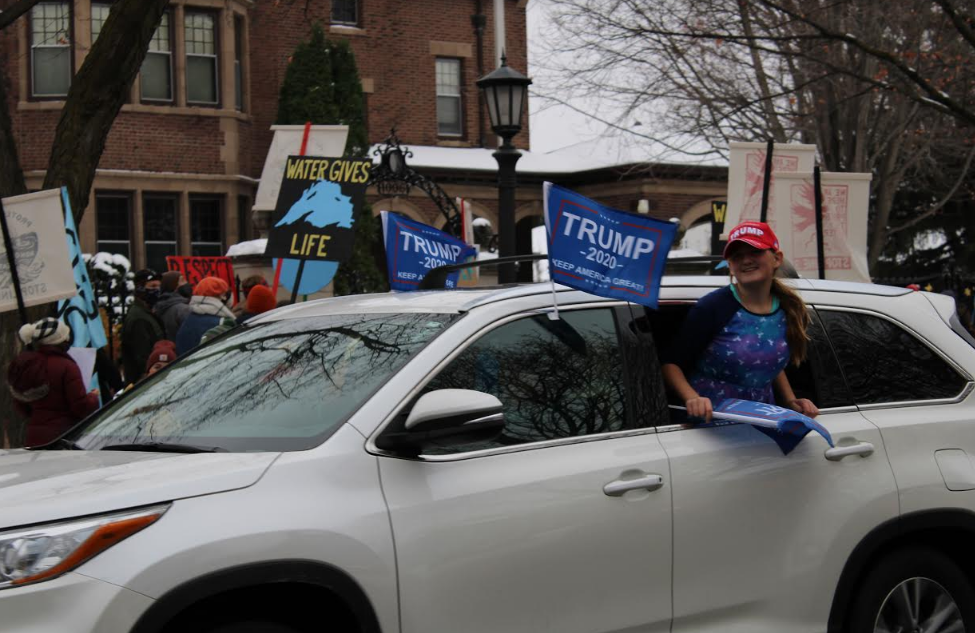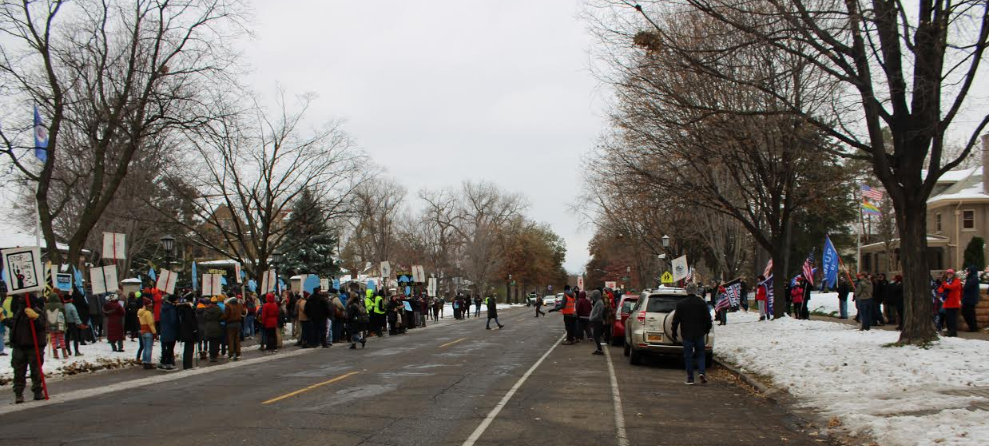
- Details
- By Darren Thompson
SAINT PAUL, Minn. — Today, protesters against Line 3 clashed with pro-Trump counter-protestors in front of the Governor’s Mansion in Saint Paul, Minn.
On Thursday, November 12, 2020, the Minnesota Department of Natural Resources and the Minnesota Pollution Control Agency (MPCA) approved various permits for Enbridge’s Line 3, moving the Calgary-based pipeline replacement project closer to completion.
Enbridge’s Line 3 is the largest project in the company’s history, and would be one of the largest crude oil pipelines in the continent, according to a statement on the https://www.google.com/url?q=https://www.enbridge.com/Line3ReplacementProgram.aspx&source=gmail&ust=1605492830789000&usg=AOvVaw3Uqlod5fzylNiyFkcmnH9O">company’s website. Line 3 is expected to transport up to 760,000 barrels a day through Northern Minnesota, passing through treaty lands of several Ojibwe bands.
Canada, North Dakota, and Wisconsin have all approved their segments of the pipeline.
Line 3 has been a hotly debated topic for several years, having both vocal proponents and opponents, citing climate change, job creation, safer transportation of crude oil, and tribal sovereignty.
Current Minnesota Governor Tim Walz has previously made comments on social media against pipelines, specifically because they pass through tribal lands, but at the time he made them, he was a state representative. He hasn’t since made public comments either supporting or opposing the project.
Community organizations, leaders, and tribes have all spoken against the pipeline.
“As many people know, I have long expressed opposition to the Line 3 project and my position has not changed,” said Lt. Governor Peggy Flanagan in an email to Native News Online.
Flanagan is an enrolled member of the White Earth Band of Ojibwe and is considered by many to be one of Line 3’s biggest opponents.
The Star Tribune reported that White Earth Band of Ojibwe Tribal Chairman Michael Fairbanks wrote a letter to MPCA Commissioner Laura Bishop and asked the agency to deny permission of Line 3 citing that the activity will be a super-spreader for COVID-19.
“The Governor and Minnesota Pollution Control Agency Commissioner Laura Bishop decided that this [decisionhttps://www.foxnews.com/us/michigan-governor-seeks-shutdown-of-great-lakes-oil-pipeline">statement, “They [Enbridgehttps://mn350.org/campaigns/stop-line-3/stop-line-3-what-are-the-risks/">website, oil transported through Line 3 is the equivalent of the total CO2 daily emissions of 16-18 million cars, every year the pipeline operates.

As Line 3 protesters stand outside the Govenor's Mansion, Trump supporters show up to erroneously claim the election was stolen.
Towards the end of the two-hour event, the crowd of nearly 400 protestors against the permission of Line 3, were met with pro-Trump supporters voicing their support for pipelines. They cited a fraudulent election, a claim that is being widely denied in courts and in media throughout the country.
Pro-Trump supporters eventually swelled to a crowd of nearly 300 people in front of the Governor’s Mansion, wearing Proud Boys memorabilia, waving Trump | Pence flags, and carrying assault-like rifles with alcohol in their hands chanting, “Four more years!”
More Stories Like This
Trump signs law that revokes some limits on drilling in Alaska’s National Petroleum ReserveSouthern Sierra Miwuk Nation Gets 900-Acres ofLand Back
Chilkat Indian Village Tells New Palmer Mine Owners They Are “Not Welcome” in Chilkat Valley
Tribes, Coastal Group Ask Army Corps to Revoke Permit for Texas Export Terminal
Michigan Tribes Tell Supreme Court: Don’t Bail Out Enbridge
Help us defend tribal sovereignty.
At Native News Online, our mission is rooted in telling the stories that strengthen sovereignty and uplift Indigenous voices — not just at year’s end, but every single day.
Because of your generosity last year, we were able to keep our reporters on the ground in tribal communities, at national gatherings and in the halls of Congress — covering the issues that matter most to Indian Country: sovereignty, culture, education, health and economic opportunity.
That support sustained us through a tough year in 2025. Now, as we look to the year ahead, we need your help right now to ensure warrior journalism remains strong — reporting that defends tribal sovereignty, amplifies Native truth, and holds power accountable.
 The stakes couldn't be higher. Your support keeps Native voices heard, Native stories told and Native sovereignty defended.
The stakes couldn't be higher. Your support keeps Native voices heard, Native stories told and Native sovereignty defended.
Stand with Warrior Journalism today.
Levi Rickert (Potawatomi), Editor & Publisher
